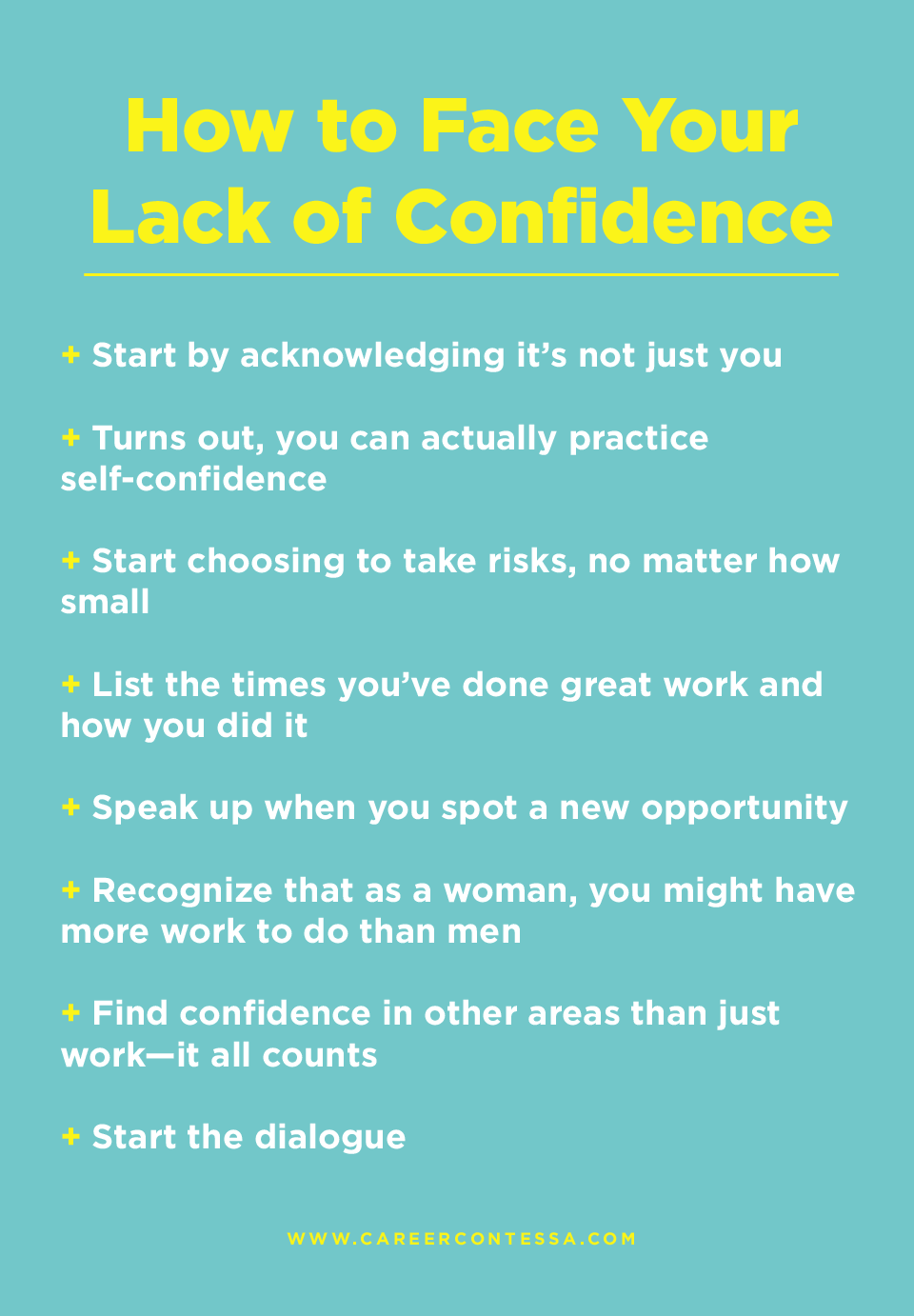"You have so much confidence!" I couldn’t suppress a laugh. "I don't know about that," I said with a perceptible eye roll. “Well then, you're really good at faking it.”
There it was, I was discovered. My boss now knew I was a fraud. But then she said, "That's not a bad thing. I'm scared a little bit every day as an entrepreneur. But we either have to learn and get out of our comfort zone or lose out on our dreams."
This conversation on the New York City subway with
my then-mentor seemed minuscule at the time. I was an intern, still finishing school, with other things to focus on besides taking risks at work or in social situations. Now, two years post-graduation, I see what she meant.
There’s a good chance that if you’re a. reading this and b. a human being, that you’ve questioned yourself from time to time. It's common to feel judged or not good enough, but the resulting lack of confidence plays a very specific role in the workplace. While there is quite a bit of advice on how to
work towards a more confident you, it never hurts to dig deep to determine the cause behind your lack of self-confidence. Understanding your triggers will help you address
negative thoughts, low self-esteem, and weaknesses head-on and make
confidence a natural part of who you are.
What is Confidence
It's easy to get confidence confused with ego or narcissism, however, true confidence means having a healthy relationship with yourself. You have a positive self-image, you have a high dose of self-worth that isn't tied to external factors, and you accept both your strengths and weaknesses. When you're truly confident you know who you are, accept who you are, and embrace all parts of who your life and personality.
Why Does Confidence Matter?
Research and anecdotal evidence show that self-confidence can create the following:
- An overall sense of well-being
- Mental health and physical health are more of a priority
- Better performance at work
- Increased resilience and grit
- Better chance at success and achieving goals
- Self-love and acceptance
- Healthier relationships and interpersonal skills
- An openness to try new things
8 Tips for How to Be More Confident
Confidence can feel impossible when self-doubt is a near constant, however, the good news is that self-assurance is a learnable trait. If you're ready to increase your confidence, let's tackle this together in just a few steps!
Start By Acknowledging It’s Not Just You
Everyone experiences moments of inadequacy.
Mindy Kaling famously admitted her most challenging moments—and, more importantly, continued to speak out about them in face of cyber trolling and criticism. In an
interview with Glamour, Kaling shared her advice for “faking confidence,” and shedding light on an issue that affects everyone, but maybe particularly women: “The scary thing I have noticed is that some people really feel uncomfortable around women who don’t hate themselves. So that’s why you need to be a little bit brave.”
In other words, there’s a reason why you hear “Fake it til you make it,” so often. It’s great advice. But to “fake” something implies that you’re in some way inadequate and that doesn’t exactly break the timidity cycle. That’s why it’s also important to address insecurities and accept the fact that confidence may take a little more work.
As part of that work, start by being kind to yourself and not ignoring your own self-care. Depression, anxiety, and other serious mental health concerns can also hinder your ability to build your own self-confidence. Once you realize how much confidence relies on your inner well-being as much as your outside skills, etc. you'll feel more urgency to not ignore other parts of your life.
Turns Out, You Can Actually Practice Self-Confidence
Career Coach Kelly Poulson explains it this way: “I’m lucky enough to recognize those moments of low confidence when they appear and don’t let them stop me from speaking up or going after what I want. Too often, people assume what they’ve got to share won’t make a difference and keep it to themselves.”
Once we understand that our low self-confidence is in fact a hindrance to us, we can look deeper to work towards becoming the version of ourselves we may have never known could even exist.
You’ve probably heard of
impostor syndrome, which more or less amounts to giving into perceptions (usually false) that we aren’t good (or smart or pretty or fun...) enough. The feeling happens at work particularly often. Some things I love to do when I hear that negative self-talk creeping in is to practice positive
affirmations. My go-to is a few deep breaths and repeating "You are smart. You are capable. And you got this."
Start Choosing to Take Risks, No Matter How Small
When speaking about her successful work with a client, Kelly mentioned “She (the client) took the bold step of
moving on from her role and finding work she truly enjoyed. And that’s not to say all doubt has disappeared, but when the end game is something she’s truly passionate about and interested in, she’s willing to conquer the doubt to get there.
On
Forbes, Margie Warrell describes research suggesting that human brains can be rewired in ways that affect thought and behavior at any age. “No matter how timid or doubt-laden you’ve been up to now, building self-confidence is largely what psychologists called volitional. Or to use layman language: ‘By choice.’”
Self-doubt is a symptom of many factors that vary in severity from person to person. While it may not apply to everyone’s situation, it is encouraging to know that change could be possible. You can create
positive outcomes by starting with positive thoughts and positive thinking.
List The Times You’ve Done Great Work And How You Did It
“I often ask clients to tell me about a time when they conquered something they thought they couldn’t, to talk to me about what it was about them that got them through that experience successfully,” says Poulson, “[Then I] remind them of their overall badassery (that is a technical term!) and ask them how those
skills will also get them through whatever challenge they are currently facing now.
If that’s too tough, I might suggest that they reach out to those closest to them to have them ask what do people find most inspirational about them or their
strengths. Sometimes hearing praise from new people allows you to hear it in a way that you might not be willing to from yourself.”
Most importantly, we don’t have to go it alone. Asking for help to discover why your feelings of doubt exist will only help in the long run.
Speak Up When You Spot a New Opportunity
On some occasions, a lack of confidence can cost professionals their
career advancement, whether it's a
promotion, international opportunity, or other something else. While it’s not guaranteed that these tendencies will ruin your career, confidence can only help.
The ability to advocate for yourself and communicate efficiently with colleagues about your worth can help others have confidence in you and often, you gain their trust in return. “It’s fairly common that people don’t speak up about opportunities they are interested in because they feel like they aren’t good enough and miss out on chances to progress in their careers,” Poulson explains.
Get clear on what your expertise is and make a list of your positive qualities. Then start practicing advocating for yourself in small ways where the stakes are lower. You will not only build your confidence muscles but you'll be reminded with your list of what you bring to the table and give yourself that extra confidence boost daily.
Recognize That As a Woman, You Might Have More Work to Do Than Men
Why does that seem to always be the case? But seriously, much like the gender pay gap, there’s also evidence of a confidence gap. In
The Atlantic, Katty Kap and Claire Shipman explain its role in the inequalities women may face throughout their careers. “We began to talk with other highly successful women, hoping to find instructive examples of raw, flourishing female confidence. But the more closely we looked, the more we instead found evidence of its shortage,” the authors said.
Poulson agrees that we’re facing a bigger task. “I think we all battle these demons. Men or women. It’s just that men seem less phased by the willingness to try or are less willing to discuss it openly,” she says. “Women need to be mindful of what gets in their own way, internally, environmentally, or otherwise.”
Find Confidence In Other Areas Than Just Work—It All Counts
If your biggest challenges feel too daunting to face right away (like
asking for a raise or speaking up in front of your
boss), focus on something unrelated, like the physical tasks that improve brainpower and get your body moving.
Poulson says that doing something as simple as walking your dog, strength training, or any activity you’ve never done before may seem menial, but it begins to train your brain and body to accept new things, increase endorphins, and leads to a more positive perspective overall.
She also suggests following Amy Cuddy's advice in
Presence and reading her research on power poses and
body language. “Be mindful of how you carry yourself. Your posture can impact how you’re feeling and experiencing the world around you. Not to mention the cues you’re giving to those around you.”
If you've ever experienced
social anxiety before a
networking event (ahem, me!), then you know that your nerves can impact your body language—which then impacts your willingness to take risks like introducing yourself to someone new, sharing your personal pitch, etc. It's all connected and doing some power poses before your next event can really help!
Start the Dialogue
Maybe the biggest challenge with self-confidence is overcoming the stigma around admitting that you're feeling self-conscious or untalented. Perfection is not the goal here. “Be open about the challenges you face,” says Poulson, “Find mentors, friends, colleagues, and people you can openly discuss these things with to start yourself off on the right foot. Finding the right partners and guides can make all the difference in your experience.”
Like most concerns in life, there isn’t one answer to becoming more confident. Start by staying the course and making these tiny changes here and there. Who knows? Maybe you’ll surprise yourself.












